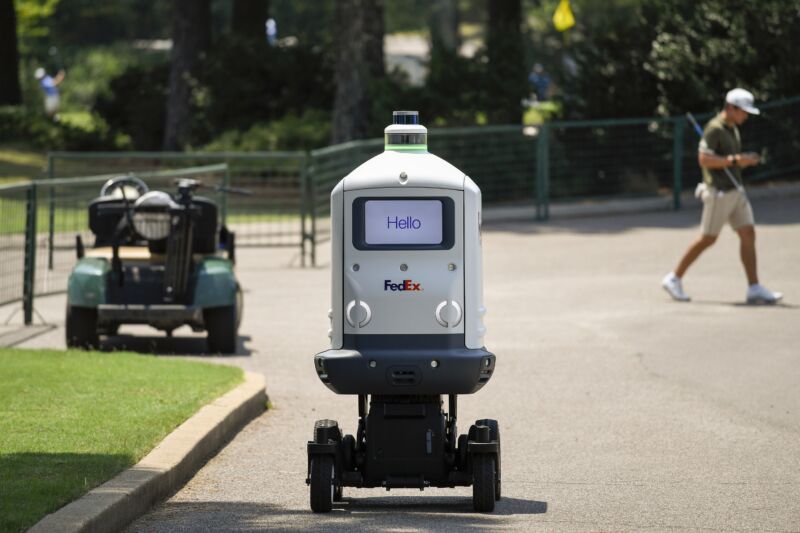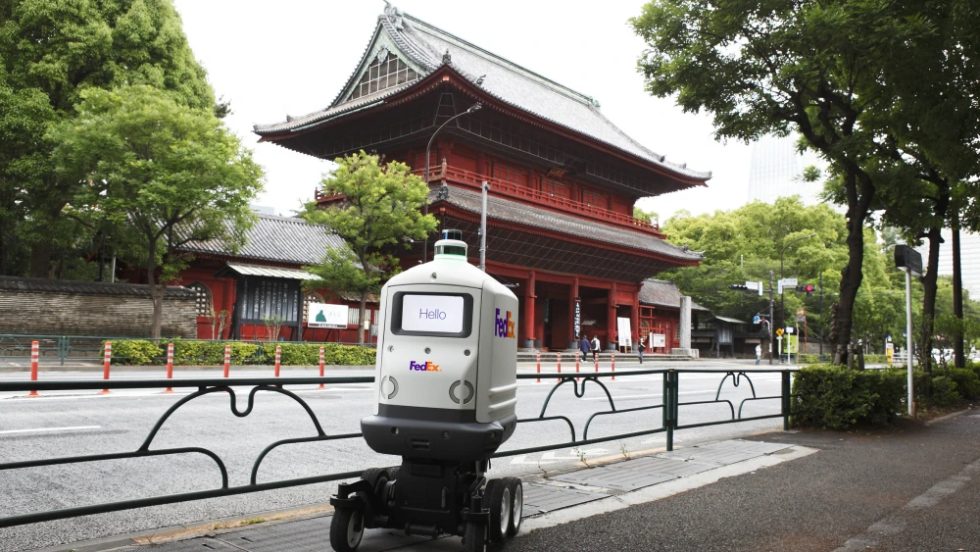
The courier company FedEx is abandoning a project to develop last-mile delivery robots. In 2019, FedEx partnered with New Hampshire-based DEKA Research and Development Corp, founded by Segway inventor Dean Kamen, to develop a wheeled robot called Roxo for last-mile deliveries.
But FedEx decided to end the project in early October, according to a report in Robotics 24/7. FedEx employees were told of the decision via an email from the company's chief transformation officer, Sriram Krishnasamy, who explained a new corporate strategy called "DRIVE."
"Although robotics and automation are key pillars of our innovation strategy, Roxo did not meet necessary near-term value requirements for DRIVE. Although we are ending the research and development efforts, Roxo served a valuable purpose: to rapidly advance our understanding and use of robotic technology," Krishnasamy wrote.
Roxo is a 62-inch-tall (1,575-mm) package bot; it weighs 450 lbs (204 kg) and has a cargo capacity of up to 100 lbs (45 kg). It was designed to navigate around sidewalks and roadsides and between pedestrians and parked cars to deliver its cargo to a customer's door. It combines a 360-degree lidar sensor with 360-degree long-range cameras above its rounded shell. There are 180-degree stereo cameras and a 360-degree radar sensor around the base, and a display that can deliver messages is set into the front of the bot.
All of this sits atop a battery-powered drive unit with four drive wheels. The unit is based on DEKA's iBot wheelchair base, a proven platform with millions of hours of real-world use. The robot is even able to climb curbs and negotiate terraced steps to get to its destination.

FedEx has been testing Roxo in the US in Tennessee, New Hampshire, and Texas—and even as far afield as the United Arab Emirates and Japan. But a clue to Roxo's precarious position can be seen in the robot's FAQ on FedEx's site, which notes that "because autonomous last-mile delivery is one of the priciest and most complex parts of the delivery process, we are aiming to make this a cost-effective solution."
Companies are interested in last-mile delivery robots like Roxo because they can replace more expensive deliveries by humans. Those financial concerns exist alongside a corporate desire to reduce carbon emissions and traffic congestion, according to FedEx.
"We are immensely proud of our role in working with DEKA to advance this cutting-edge technology that has put it on the path to future implementation, and we remain committed to exploring last mile innovations that align with our business strategy," FedEx said in a statement.
Roxo isn't FedEx's only foray into new technology. It has also been conducting trials of drone deliveries with an Alphabet company called Wing in the town of Christiansburg, Virginia—whether this project survives FedEx's new corporate strategy remains unknown. I expect to see its delivery drivers using BrightDrop's EP1 electric pallet, which can carry up to 200 lbs (91 kg) of packages from the delivery vehicle to the customer. A new General Motors company, BrightDrop, has also developed an electric delivery van for which FedEx was the first customer.
Roxo isn't the only delivery bot to disappoint in testing, either. According to the Verge, Amazon is scaling back its Scout delivery bot program, which had been doing last-mile deliveries in suburbs outside of Seattle, as well as in Southern California, Georgia, and Tennessee.
reader comments
78